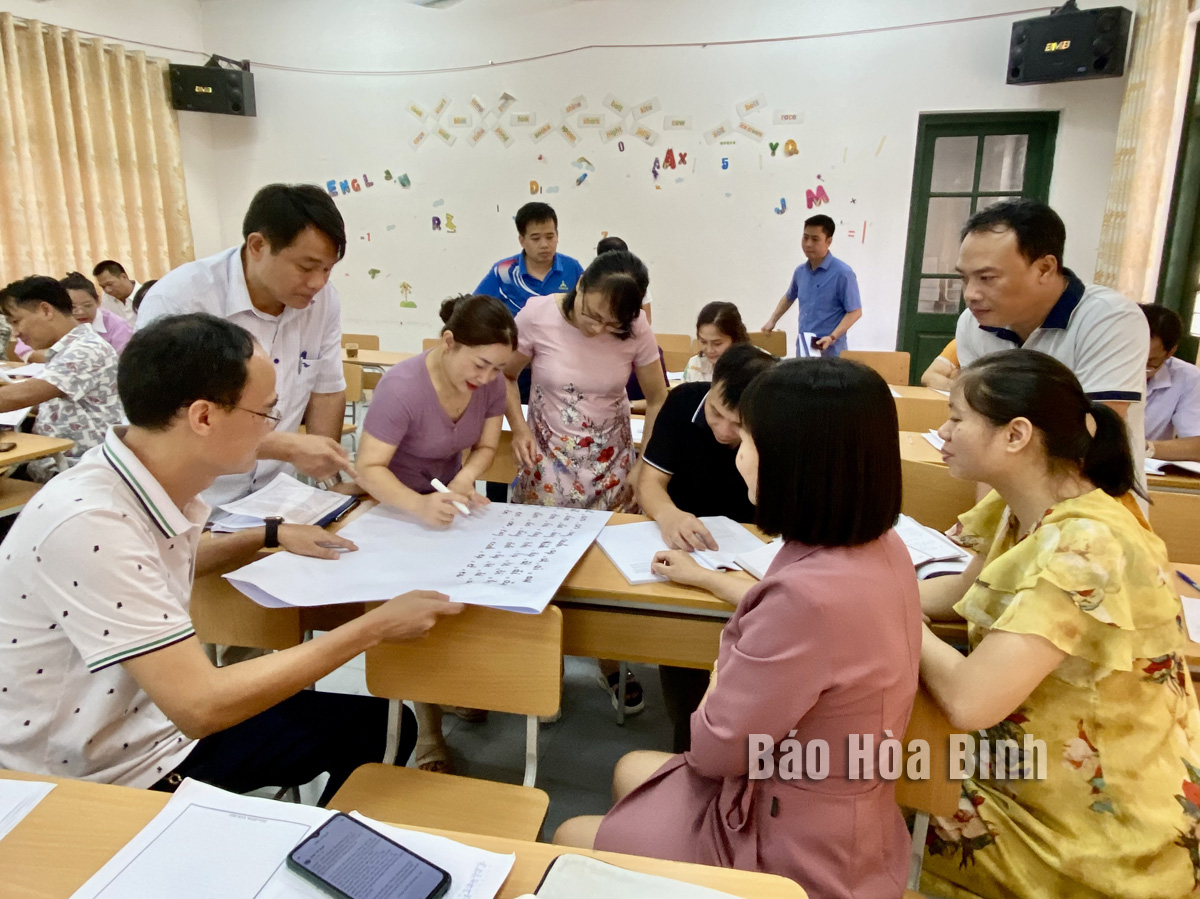
As the Muong ethnic people make up more than 63% of Hoa Binh province’s population, joint efforts have been made to preserve the Muong language. The Muong community in the province now use both Vietnamese and their mother tongue daily with the latter preferred in communication in family life.
Students at a Muong language class.
In 2016, Hoa Binh province developed and officially put into use the Muong ethnic script which helps Muong ethnic children learn and use the Muong language – a way to preserve and promote national cultural identity.
According to folk culture researcher Bui Huy Vong, from Huong Nhuong commune, Lac Son district, the Muong ethnic script plays an important role in preserving the intangible cultural heritage of Mo Muong accurately, completely and scientifically.
Mo Muong is a job and also a performance practised at funerals, religious festivals, and life cycle rituals by the Muong ethnic group. The art consists of Mo prayers and performances, by Mo practitioners, or Mo artisans. Through generations, Mo prayers have been passed down verbally in the community.
Vong said that the script of Mo Muong can be used and translated into other languages to facilitate the establishment of scientific documents about Mo Muong. Moreover, with the scrips, the Muong language can live forever with other Muong cultural values. Seeing the fact that a group of the young generation of Muong people or local State employees doing mass mobilisation work cannot speak the Muong language, the provincial People’s Committee in 2019 approved a project on Muong language teaching and learning in the 2018-2025 period with a vision to 2035.
In 2023, Hoa Binh Pedagogical College opened Muong language classes for local officials, civil servants and public employees.
Do An, a student of a Muong language class, said that he now can speak Muong language which is useful for his work. Moreover, it helps him understand more about the customs and culture of the Muong ethnic group.
According to the 2024 - 2025 plan, the province’s Department of Education and Training will open other classes for 2,500 local officials, civil servants and public employees plus 2,500 teachers of schools across the province.
In addition, the province also pays attention to popularising and mobilising the community to preserve the Muong language, particularly through folk songs.
Hoa Binh province has carried out multiple programmes and initiatives to revive its cultural heritage which has gradually fallen into oblivion through the ebbs and flows of history.
The most prominent and defining feature in the prehistoric era of Hoa Binh is the Hoa Binh Culture. The Culture was first discovered in Hoa Binh. The significant prehistoric culture represents not only Vietnam but also Southeast Asia and southern China. Through excavations of cave sites in the limestone regions of Hoa Binh, French archaeologist M. Colani introduced the world to a "Stone Age in Hoa Binh province – Northern Vietnam" in 1927. On January 30, 1932, the First Congress of Far Eastern Prehistorians, held in Hanoi, officially recognised the Hoa Binh Culture.
Known as the "Land of Epic History”, Hoa Binh province, the gateway to Vietnam’s northwest, boasts a strategic location and a unique cultural tapestry woven by its ethnic minority communities.
The People's Committee of Luong Son District recently held a ceremony to receive the certificate recognizing Sau Communal House in Thanh Cao Commune as a provincial-level historical and cultural site.
Recognising the importance of cultural heritage preservation in protecting and promoting the value system of Vietnamese culture, and serving socio-economic development in the new period, Party committees and local administrations in Hoa Binh province have identified it as a key task in the cultural development strategy. The province has been making efforts in mobilising resources, creating consensus among people and engaging ethnic communities in preserving and promoting cultural identity.
Hoa Binh province has captured growing attention both domestically and internationally for its distinctive cultural heritage and rich history. Most notably, it has been renowned for its famous Hoa Binh culture, considered the cradle of ancient Vietnamese civilisation. Looking ahead to significant milestones in 2025 and the 140th anniversary of province establishment in 2026, Hoa Binh Newspaper presents a comprehensive overview of the province's development across economic, social, cultural, tourism, and security domains.



